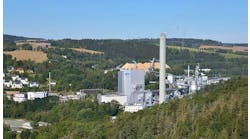"ABB in North America is expanding and growing its presence, increasing its investments and growing its value to customers," said Greg Scheu, ABB Group's newly appointed head of customer and marketing solutions. "We're achieving these goals through the organic growth of our power production and power systems, process automation business and, in discrete automation and motion, with our recent acquisition and integration of Baldor. Meanwhile, our inorganic growth has come from the significant value and growth of our low-voltage business and by our soon-to-be-completed acquisition of Thomas & Betts."
Scheu added that ABB is crystallizing its concentration on North America and other well-defined regions with an "In Country, For Country" strategy that sharpens its focus on the priorities and values of these regions and improves services to better meet those needs. To back up its promises with action and capital expenditures, he reported that ABB is in the process of building a $100-million, high-voltage, direct-current (HVDC) cable manufacturing plant in Hunterville, N.C., helping to expand Baldor's motor-building facilities, and already has had more than 400 customer visitors to its Smart Grid Center of Excellence at North Carolina State University in Raleigh, N.C.
Likewise, Enrique Santacana, president and CEO of ABB Inc., was even more succinct in describing how crucial North America is for his company. ABB Inc. is ABB Group's North American division. "ABB in North America represents the largest installed base of ABB's power and transmission and distribution equipment," said Santacana. "North America is our largest market for products, systems and services such as discrete automation and motion, low-voltage products, power products, process automation and power systems."
With its headquarters in Cary, N.C., ABB Inc. has nearly 19,000 employees working in the U.S., Canada and Mexico, and serves the firm's five main operational areas, including manufacturing, assembly, services, sales and engineering, and research development. In fact, ABB Inc.'s five product divisions—power, power systems, discrete automation and motion, low-voltage and process automation—already had $8 billion worth of orders in 2011.
"In North America, we already have numerous strategically located service centers, and with our anticipated acquisition of Thomas & Betts, we're going to double our North American footprint again," explained Santacana.
He added that ABB is using its wide portfolio of solutions and services to address seven global megatrends, which will enable it to overcome short-term economic volatility and continue to grow over the long term both in North America and beyond. These megatrends consist of resource economics, green technologies, transportation and mobility, electrification and communicating to smart grids, increasing urbanization, digital information and data center growth, and power shifts in emerging economies.
On the process industry side, Sandy Taylor, global business unit manager for ABB's chemical, oil and gas business, reported that ABB is active across the entire oil and gas value chain. The markets it serves include oil and gas exploration and production, oil and gas transportation and distribution, refining, petrochemical, chemical, and marine supply, transport and support.
"All of ABB's product divisions are active in oil and gas too," said Taylor. "We have thousands of successfully completed projects worldwide and had more than $4 billion in sales in 2011. We hold the number one position in the upstream oil and gas DCS market, and we have more than 7500 dedicated chemical, oil and gas employees in 40 countries."
Taylor added that oil and gas and other process industry users prefer to buy unified bundles of technologies and services, and that ABB can serve at whatever main electrical contractor or main automation contractor level they require. "We're getting involved in many projects much earlier in the design stages, and this can help everyone reduce costs. But we're able to bundle in many electrical solutions, and this helps many users even more by combining our best-in-class technology with our execution excellence."
Despite traditional research indicating that many hydrocarbon resources have reached a peak and will decline in the future, Taylor added that more recent data shows that only about 1 trillion barrels of oil and gas equivalents have been consumed throughout history, and that about 9 trillion barrels remain. Meanwhile, though demand for oil and gas from established economies won't grow as quickly, most increases in future demand will come from emerging economies. "The only question is at what price will this oil and gas be available. Previously, most oil and gas was located on shore or near shore, and so it cost about $10 to $30 per barrel to produce. However, most future oil and gas will come from deep water, shale and other sources, and these will costs about $60 to $100 per barrel to produce."
To aid these efforts, ABB is already constructing sub-sea drives, transformers and other systems that can operate down to 7000 feet below sea level and run for years without requiring maintenance. Not surprisingly, ABB plans to use its HVDC cables to deliver efficient, long-range power to many of these devices. ABB is also helping 100 customers automate 20,000 sites with a variety of horizontal drilling equipment, which is used in hydraulic fracturing to free natural gas and oil from shale formations. In addition, Taylor added that ABB's 800xA Extended Automation DCS platform and related HMI solutions will help users monitor and manage these new process applications.






